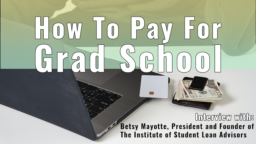TUN incontra Betsy Mayotte, presidente e fondatrice dell'Institute of Student Loan Advisors (TISLA), per fornire consigli su come pagare la scuola di specializzazione.
TUN: Betsy, grazie mille per esserti unito.
MAYOTTE: Nessun problema. Grazie per avermi ospitato.
La scuola di specializzazione è un grande investimento. Prima di entrare nei dettagli, hai qualche consiglio su quali fattori finanziari gli studenti dovrebbero considerare prima di decidere se la scuola di specializzazione è o meno la mossa giusta per loro?
Lo voglio. Purtroppo, i tempi dell'educazione fine a se stessa, e questo mi spezza il cuore, sfortunatamente, non è più il mondo in cui viviamo. Quindi, vuoi davvero fare un'analisi del ritorno sull'investimento quando stai pensando di entrare a scuola.
Fatti un'idea di quanto debito dovrai assumerti - non solo quanto debito ti assumerai, ma cosa sarà in termini di pagamento mensile? Qual è lo stipendio medio iniziale per la carriera che vuoi intraprendere? Fai un budget basato sullo stipendio iniziale medio per quella carriera e poi vedi se i numeri hanno un senso.
Grande. Quindi, il denaro gratuito è sempre meglio del denaro preso in prestito. Prima di parlare di prestiti agli studenti, quali altre opzioni di aiuto finanziario sono disponibili per gli aspiranti dottorandi?
Non ci sono tanti soldi gratuiti per gli studenti laureati quanti ce ne sono per gli studenti universitari. Ma ci sono borse di studio, e soprattutto se ti occupi di matematica e scienze, ce ne sono ancora parecchie là fuori.
Ci sono alcune ottime ricerche di borse di studio gratuite che consiglierei. Non è necessario pagare per l'aiuto in questo. Il College Board ha una buona ricerca gratuita di borse di studio. Finaid.org offre anche una buona ricerca gratuita di borse di studio, così come Mapping Your Future. Tutte e tre queste organizzazioni sono no-profit e non fanno pagare per le loro ricerche di borse di studio.
Un'altra opzione per ottenere una laurea e ridurre i costi di riduzione del prestito, anche se potrebbe richiedere un po' più tempo, è cercare di trovare un datore di lavoro con rimborso delle tasse scolastiche e approfittare di tale rimborso.
Forse non andarci a tempo pieno. Lavori a tempo pieno, ma non ti prendi i debiti. In sostanza, ottieni quella laurea gratuitamente.
Grande. Passiamo ora ai prestiti studenteschi. Come possono gli studenti richiedere e ricevere prestiti studenteschi federali per la scuola di specializzazione? Il processo è simile a quello degli studenti universitari?
È lo stesso. Per prima cosa compili il file Domanda gratuita di aiuti federali agli studenti (FAFSA). L'altro vantaggio è che, se ci sono sovvenzioni disponibili, o se la scuola ha borse di studio istituzionali, inizieranno con la FAFSA ad assegnare anche quelle.
Dopo aver compilato la FAFSA, riceverai una lettera di premiazione dalla scuola. Parte della lettera di aggiudicazione sarà l'idoneità al prestito e poi si passa da lì.
Grande. Che tipo di prestiti sono disponibili e gli studenti possono scegliere quale tipo di prestito e quanti soldi prendere in prestito?
Sì, sì e più o meno. Anche gli studenti laureati possono ottenere Prestiti di Stafford, e questo dovrebbe essere il primo prestito che ottengono al massimo prima di raggiungere qualsiasi altro prestito.
Gli studenti laureati, sfortunatamente, ora non possono ottenere prestiti Stafford sovvenzionati. Possono ottenere solo prestiti Stafford non sovvenzionati, quindi dovresti anche prendere l'abitudine di pagare almeno una parte, se non tutti, degli interessi su base mensile o trimestrale in modo che il debito non cresca.
Se il prestito Stafford non copre il costo della frequenza e hai bisogno di altri prestiti, puoi ottenerlo Prestiti per laureati, anch'essi non sovvenzionati. Non c'è limite a questo. Il limite è il costo della frequenza meno qualsiasi altro aiuto. Ma ti avverto. Solo perché puoi prendere in prestito tale importo non significa che dovresti prendere in prestito tale importo.
Se il rimborso delle tasse scolastiche non è sufficiente, forse potresti almeno usarlo per ridurre il prestito che devi fare.
Grande. Quindi, quando consiglieresti agli studenti di contrarre prestiti studenteschi privati?
Mai.
Lavoro con i mutuatari di prestiti studenteschi da più tempo di quanto voglia ammetterti. Ci sono pochissimi mutuatari per i quali non sono riuscito a trovare una soluzione, ma tutti questi mutuatari sono stati mutuatari privati.
Forse possono ottenere un tasso di interesse più basso, ma questo non ti aiuta se non puoi permetterti il pagamento. E finisci per coinvolgere i cofirmatari, e forse non possono permettersi il pagamento.
Ho appena ricevuto un'e-mail questa settimana da qualcuno che ha co-firmato come $ 200,000 di prestiti studenteschi privati di loro figlio. Sono in pensione e il loro unico reddito è la previdenza sociale. Ora il loro bambino non può pagare i prestiti privati, quindi ricevono avvisi di incasso e vengono minacciati di una causa legale da parte del prestatore.
Quindi, i prestiti studenteschi privati, per me, sono un "mai".
Grande. Quindi, abbiamo parlato di borse di studio. So che ci sono un paio di altre opzioni, come diventare un assistente tecnico, per ottenere dei soldi dagli studenti. Gli studenti possono valutare queste opzioni prima di iscriversi a scuola?
Quando decidi la scuola che frequenterai, queste sono le cose da cercare. Hanno modi per ridurre le tasse scolastiche? Se si tratta di una scuola fuori dallo stato, forse puoi essere un assistente residente e non devi pagare vitto e alloggio, il che può davvero aumentare i costi.
Quindi, queste sono tutte cose che puoi cercare in anticipo prima ancora di fare domanda all'istituto.
Grande. Grazie, Betsy, per aver dedicato del tempo per unirti a noi oggi.
Ovviamente. Grazie per avermi ospitato.
Questa intervista è stata modificata per chiarezza.



